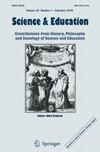Using Children’s Literature in the Middle School Science Class to Teach Nature of Science
Abstract
In this study, we report the results of the content analysis of preservice middle school science teachers’ own written science storybooks and middle school female students’ reflections of five of the books. The participants of this study were 50 preservice middle school science teachers taking a history and nature of science course and 13 sixth-grade female students in a school in Turkey. We report representations of nature of science (NOS) aspects included in the preservice teachers’ own written storybooks. Observation and inference was the most commonly included aspect among the NOS aspects, followed by the tentative NOS. We used a qualitative analysis of transcribed classroom discussions around five storybooks used by five preservice teachers in their field experiences. We found that the teachers facilitated explicit reflections about NOS aspects and science content covered in the books. Our findings build on research showing that appropriately designed children’s science books can be used as classroom tools for supporting NOS instruction. We found that writing their storybooks and refining their NOS ideas through discussions provides a powerful tool for developing preservice teachers’ knowledge about NOS. Preservice teachers facilitated discussions promoting explicit student reflections about NOS aspects and science content using these books.

 求助内容:
求助内容: 应助结果提醒方式:
应助结果提醒方式:


